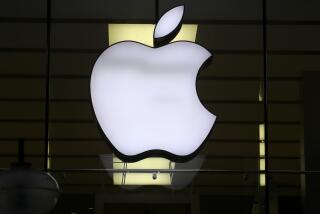IPhone price falls but users will pay more
- Share via
When Apple Inc. Chief Executive Steve Jobs announced the new price of the iPhone 3G on Monday, the number $199 fell from the top of the screen behind him. It bounced with a satisfying “boing” sound, akin to those old ads on daytime TV: “This set of knives can be yours for only $19.99!”
Apple’s marketing slogan for the new iPhone, which runs on a faster wireless network, is “twice the speed at half the price.” But, as usual, there’s a catch. People are starting to do the math and realizing that the new iPhone will actually cost more than the current versions -- but the payments are spread out. It’s like an iPhone financing plan, sponsored by AT&T; Inc.
Yes, the new iPhone, which goes on sale July 11, will cost $200 less than the current version. AT&T;, Apple’s U.S. wireless partner, said it was subsidizing the cost of the phone. Thanks, AT&T;!
But AT&T; also announced that it was raising the price of its basic unlimited data plan by $10 a month to $30 (that’s in addition to the calling plans, which start at $39.99 a month). So over the life of the mandatory two-year wireless contract, the iPhone user will pay an additional $240.
Save $200 today, but pay $240 extra over the next two years. Boing? More like “thud.”
The $240 translates to about 55 gallons of regular unleaded gasoline at current prices. But it’s all about priorities, right? Surfing the information super highway, especially while on the go, is often more satisfying than driving on a regular highway.
AT&T; executives said that even with the price hike in the data plan, they expected to take a hit in profit over the next two years. Carriers subsidizing phones is nothing new, although industry analysts say the size of AT&T;’s subsidy is higher than usual.
“I’m surprised they would have to do it with such a popular product,” said Douglas Christopher, an analyst with Crowell, Weedon & Co., a Los Angeles-based regional brokerage firm. “Weird.”
Another interesting tidbit in the fine print: IPhone buyers will have to activate the device inside an Apple or AT&T; store, meaning they won’t be able to resell them or try to hack the phones to use with another cellular carrier. That could hurt consumers, say people who want more openness and choice among U.S. wireless providers.






